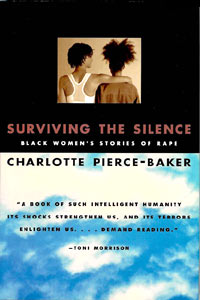Memoir and Academics
 With the publication of the book Surviving the Silence: Black
Women's Stories of Rape, my personal life was understandably
changed. But also dramatically altered was my academic/professional
life. Surviving the Silence and its being in the world has
reshaped my pedagogy. The writing of memoir and its dissemination has
shifted my thinking about "theory." There was always tension for me as I
began to write. I felt as if I were forced to make a choice of which
audience to "write for" - to speak to.
With the publication of the book Surviving the Silence: Black
Women's Stories of Rape, my personal life was understandably
changed. But also dramatically altered was my academic/professional
life. Surviving the Silence and its being in the world has
reshaped my pedagogy. The writing of memoir and its dissemination has
shifted my thinking about "theory." There was always tension for me as I
began to write. I felt as if I were forced to make a choice of which
audience to "write for" - to speak to.
I believe if we are to broaden the categories of what we call "the
academic" and challenge those "sacred boundaries," books such as
Surviving the Silence need to be read, critiqued, and fit into
the pedagogy of and about women, especially within the arena of black
women's literature and pedagogy. Colleagues across the nation interested
in issues of trauma, violence, and black women's lives (writers,
scholars, filmmakers, activists) are now more than ever working together
to develop a "language" for writing and teaching in the areas of rape,
sexual assault, and other traumas. Many of these colleagues, men and
women, have graciously used Surviving the Silence in their
college and university courses. Doing so, I believe, encourages a more
expansive pedagogy on the university front. Each time, for example, that
I use Dartmouth University professor Susan Brison's academic memoir,
Aftermath, or practicing psychologist Martha Manning's
professional memoir, Undercurrents, or Duke University professor
and colleague Karla F.C. Holloway's personal yet academic treatise,
Passed On - when I recur to these texts - I know I am shifting
and expanding the parameters of trauma, literature, theory, and the
"lived lives of women."
Graduate-student scholars have been some of my most ardent
supporters, analyzing and critiquing in their classes the text
Surviving the Silence. Now I better understand what I
accomplished by writing through memoir; I can now evaluate the
process as well as the consequences of many of my writing
decisions.
It was in 1990 that I began to think about writing what
eventually became (in 1998) the book Surviving the Silence: Black
Women's Stories of Rape. The book's foundation was extremely
personal: that is, it was motivated by my own rapes, rapes perpetrated
by two black males - burglars, in my own home - as the legal version has it:
"rapes committed in the process of another crime." In spite of that very
personal beginning, my initial thinking on the content of the
book I was writing was to produce an academic piece on rape,
slavery, black men and women, and the impact of sexual violence on black
lives. After all, I was an academic; therefore, I told myself, I should
write something totally academic - footnotes, bibliography,
allusions - the whole academic bundle! My research began with the idea of
producing - in book form - an "ethnography of black rape." With this focus,
all seemed to be taking shape-gaining purpose, I thought. And I began to
interview black women rape survivors. The audiotapes increased in
number. However, as I interviewed the women, I soon became patently
aware of two things: one: I was not writing, and two: I was in
denial about my own rapes. I was surely procrastinating (or what we, in
the field of trauma, sometimes call "paralyzed by fear"). I had
unraveled an incredibly intricate string of secrets and continued
silences - and I was at the center of it all. My realization became
clear: I was still "in hiding" and not openly talking about my own
wounding. I had, thus, failed in the face of the first goal of
writing memoir: truth telling. If I had failed at truth telling,
then, how could I possibly face "objectively" and in supportive ways the
other women and their narratives? The answer was, I couldn't - nor should
I ever have thought I could. In fact, the actual writing (that is, words
on the page) of Surviving the Silence did not begin until I had
"owned up to" my own rapes, the details, the aftermath. It was almost as
if I were not allowed to transcribe the words of the other women
until I had "faced myself." It was at this juncture I realized - I was
creating community. And in such a community one must share "the
unspeakable." Mine was no longer a solely academic endeavor. And it was
then that I remembered feminist scholar Carolyn Heilbrun's proclamation
that "it is not so much women's lack of language as their failure
to speak profoundly to one another" (emphasis mine) (Writing A
Woman's Life, 43). And with that, my fingers gained strength!
|